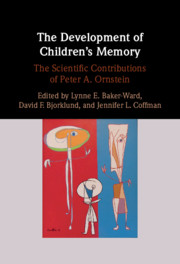Book contents
- The Development of Children’s Memory
- The Development of Children’s Memory
- Copyright page
- Dedication
- Contents
- Figures
- Tables
- Contributors
- Part I Backdrop
- Part II Children’s Memory Strategies
- Part III Children’s Event Memory
- Part IV Family Socialization of Memory
- Chapter 11 Developmental Pathways to Skilled Remembering
- Chapter 12 Making Memories in Museums
- Chapter 13 The Socialization of Gratitude
- Chapter 14 How Memory Develops in Conversational Contexts
- Part V Classroom Socialization of Memory
- Part VI Perspective
- References
- Index
Chapter 13 - The Socialization of Gratitude
How Parent–Child Conversations Impact Children’s Memory for Gratitude-Related Events
from Part IV - Family Socialization of Memory
Published online by Cambridge University Press: 28 May 2021
- The Development of Children’s Memory
- The Development of Children’s Memory
- Copyright page
- Dedication
- Contents
- Figures
- Tables
- Contributors
- Part I Backdrop
- Part II Children’s Memory Strategies
- Part III Children’s Event Memory
- Part IV Family Socialization of Memory
- Chapter 11 Developmental Pathways to Skilled Remembering
- Chapter 12 Making Memories in Museums
- Chapter 13 The Socialization of Gratitude
- Chapter 14 How Memory Develops in Conversational Contexts
- Part V Classroom Socialization of Memory
- Part VI Perspective
- References
- Index
Summary
A wealth of literature suggests that the ways in which parents structure joint and/or reminiscing conversations with their children have important implications for the development of autobiographical memory skills in children. It has also been suggested that the types of details that children remember about shared parent–child experiences may serve a socializing function. The details that children recall may shape their interpretation of the past and form expectations for the future, thereby reinforcing values and attitudes expressed by parents and internalized by children. It is through this mechanism that we believe that parent–child conversations about past shared experiences may socialize not only the development of memory in children but also the development of other outcomes as well, including socio-emotional outcomes such as gratitude. This chapter highlights an extension of the socialization of memory research by examining the extent to which both the structure and content of conversations between parents and children about previous gratitude-related events shape what children remember about those experiences.
Keywords
- Type
- Chapter
- Information
- The Development of Children's MemoryThe Scientific Contributions of Peter A. Ornstein, pp. 203 - 222Publisher: Cambridge University PressPrint publication year: 2021
- 1
- Cited by

